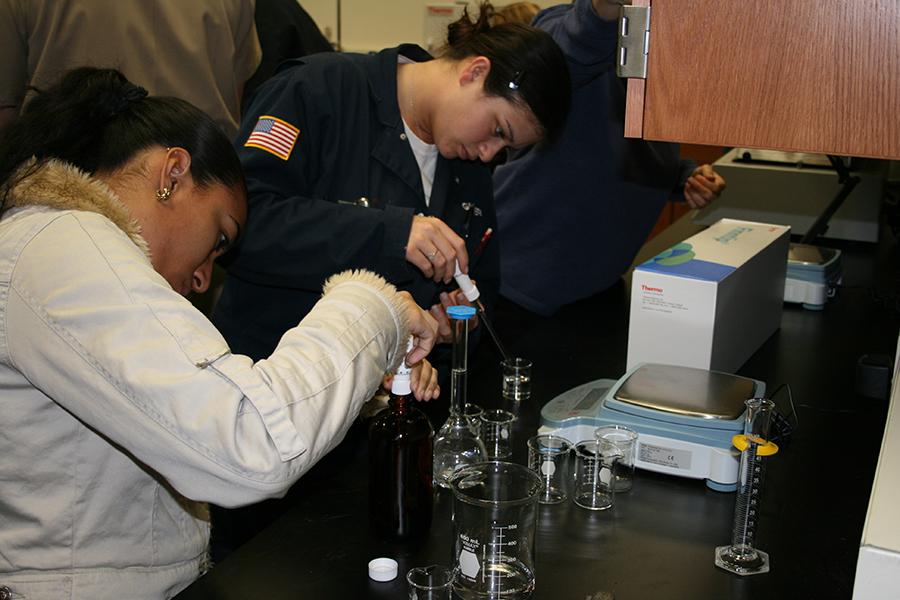
science
Vision Statement
To be recognized as a leading center of education.
Mission Statement
The dual Mission of the Science Department is to equip:
- Marine Environmental Science students with the interdisciplinary skills and technological competence necessary to analyze contemporary environmental issues through hands-on, student-centered, and relevant coursework, field work, and research opportunities.
- All Maritime students with the analytical and problem-solving foundation of knowledge they need as preparation for upper-level courses in their majors and to teach numerical and scientific literacy necessary for an informed citizenry.
Department Goals
To fulfill our Mission, we must accomplish the following Goals:
- Provide a relevant, hands-on, student-centered marine environmental science curriculum that prepares students to analyze current environmental issues with contemporary technology. Additionally, we serve the mission of Maritime College through engaging courses that impart mathematical and scientific knowledge to all students. These courses to all Maritime students serve as a basis for success in upper-level courses in their majors, while also imparting analytical skills to General Education students that they will need to engage meaningfully with scientific issues in their careers and communities.
- Recognize research and teaching as mutually reinforcing so we strive to advance the bounds of knowledge in mathematics and science through scholarly work by students and professors. To that end, we seek to provide undergraduate students with meaningful, relevant, and original research opportunities both at Maritime and beyond.
- Work together in a welcoming, inclusive, and equitable environment for all our students, staff, and faculty. We recognize that knowledge is best generated, disseminated, and taught when people of diverse backgrounds and experiences engage with each other in a mutually respectful way. We value a multiplicity of identities both because we recognize the intrinsic dignity possessed by every person, and because we know that our learning community is enhanced by our differences and strengthened by our shared quest for knowledge.
Degrees
SUNY Maritime College offers a multidisciplinary science major, a Bachelor of Science in Marine Environmental Science. Students pursue their interests by selecting core electives in marine biology, meteorology, and oceanography and they have the option to pursue a USCG Third Mate license along with their bachelor’s degree.
Students with a major other than Marine Environmental Science may select a minor in Environmental Science. This minor consists of a combination of environmental and scientific courses and is designed to provide students with a basic understanding about environmental issues.
Mathematics
All bachelor’s degrees at Maritime College include at least two mathematics courses. B.E. degrees include a four course sequence in calculus and differential equations. All B.S. degrees include one statistics course and at least one other mathematics course.
Courses satisfying the SUNY General Education Requirement in mathematics are: Math 90, Math 101, Math 111, Math 112 and Math 251.
Entering students are given placement examinations to determine their calculus readiness. If necessary, they are required to take preliminary courses in algebra and precalculus.
The Mathematics faculty is dedicated to teaching, with many instructors working in the Learning Assistance Center. The faculty have varied educational and research backgrounds, with interests ranging from Mathematics Education and the History of Mathematics to specialized disciplines such as Combinatorics and Sub-Riemannian Geometry.
Science
Most bachelor’s degrees at Maritime College include at least two science courses. B.E. degrees require two terms of both physics and chemistry; most B.S. degrees include one term of physics and one term of meteorology.
Science classes fulfilling the SUNY General Education Requirement in Natural Sciences are: General Biology I, General Chemistry I, General Geology, General Oceanography, Introduction to Environmental Science, Meteorology for Mariners, General Physics I & II and Engineering Physics I & II.
The Science Department laboratories were renovated in 2006 and 2016 and are furnished with state-of-the-art analytical equipment for undergraduate student use. A wet lab with flow through seawater tanks was constructed in 2024.
The Science Faculty includes Professors of Biology, Chemistry, Environmental Science, Meteorology, Oceanography, and Physics. They are engaged in research in the areas of Coastal and Estuarine Issues, Environmental Monitoring, Paleobiology, Marine Biological Processes, Magnetic Properties of Matter, and Condensed Matter Physics.
